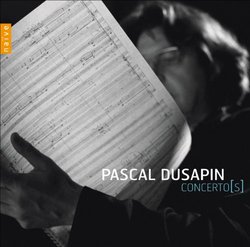| All Artists: Pascal Dusapin, Lwb, Rophe Title: Concertos: Watt Galim Celo a Quia Members Wishing: 0 Total Copies: 0 Label: Naive Original Release Date: 1/1/2010 Re-Release Date: 5/25/2010 Genre: Classical Style: Symphonies Number of Discs: 1 SwapaCD Credits: 1 UPC: 822186821817 |
Search - Pascal Dusapin, Lwb, Rophe :: Concertos: Watt Galim Celo a Quia
 | Pascal Dusapin, Lwb, Rophe Concertos: Watt Galim Celo a Quia Genre: Classical
|
Larger Image |
CD Details |
CD ReviewsUnique style from France Daniel R. Coombs | Mesa, AZ United States | 06/08/2010 (4 out of 5 stars) "Pascal Dusapin is probably and unfortunately better known in his native France and some of Europe than here in the US. Largely self taught as a composer, Dusapin has actually been writing intriguing concert hall music for over three decades. He admits the strong influence of Iannis Xenakis and Edgar Varese and perhaps a bit of Giacinto Scelsi (most will have to look him up as well!) However, Dusapin's music is also influenced by politics, social movement and personal experiences, such as loss of loved ones. (also the excellent booklet notes by Harry Halbreich indicate) The new collection of some of his concertos (Naive 782181) reveals the eclectic, attractive but somewhat eery nature of Dusapin's ouevre. The four concertos represented all have evocative secondary titles and are captivating to listen to. "Watt" for trombone and orchestra derives its title from a novel by Samuel Beckett and is quite virtuostic. Using ample extended techniques, the music is angry is places, frenetic and somewhat chaotic but facinating in its total impact. "Celo" for cello and orchestra takes its title from the Latin 'celare' (to keep hidden, secret) and also explains some of the purpose and sound of the piece. The three movements are each a unique experience; the first "tres sombre, pesant et profond" is built around minor thirds and demands that the soloist must play on a bow without rosin (ghostly, "subdued" sounds) the second begins slow but becomes more agitated and the third "never the less" ends almost violently. The piano concerto , "a Quia" makes the least impact musically but it certainly has it own meaning; rooted in response to both the "9-11" attacks as well as the indictment of Slobodan Milosevic in Serbia. "Galim" for flute and strings, in some ways, is the most traditional sounding and makes quite an impact. The title, form the Hebrew for "wave", was written for the Jean Pierre Rampal Competition in 1998 and is composed in memory of the composer's deceased wife. Alternately quiet, sad and then jerky, spasmodic; it is subtitled "requies plena oblectationis" (rest, full of recreation) All the performances are top notch; featuring Alan trudel, trombone, Juliette Hurel, flute, Sonia Wieder-Atherton, cello and Ian Pace, piano; the pieces are completed solidly by the Orchestre National de Montpelier, conducted by Christoph Eschenbach who certainly knows his way around contemporary repertoire. Highly recommended for those wanting to discover stimulating new works by a new - to us - voice.
" |

 Track Listings (8) - Disc #1
Track Listings (8) - Disc #1